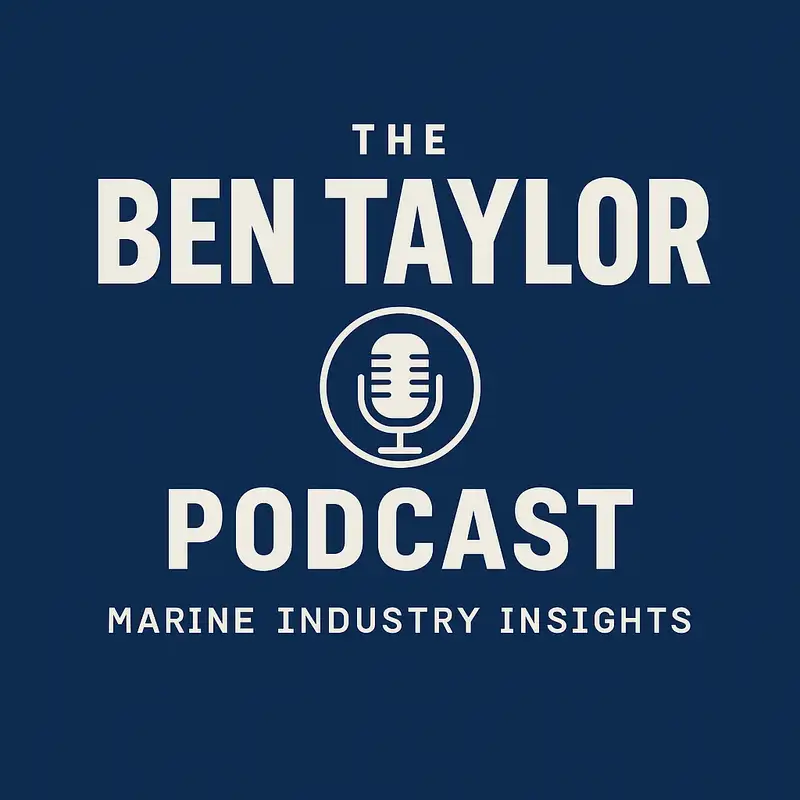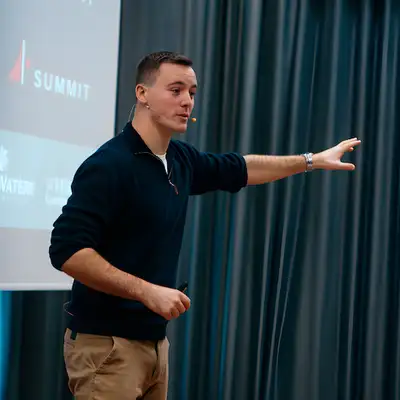
AI in Yacht Management Software
We'll always have a layer of human review and approval before we're handing out recounts to boats that are asking us to do this work for them. This is the Ben Taylor Podcast, the home of marine industry insights. Enjoy. Hi, everybody. Welcome back to another episode of the Ben Taylor Podcast. This is part of a little series to profile the Australian yachting industry and a couple insights about what's going on down under. I'm here with Sam Wheaton. Nice to see you, Sam. Ben, good to see you. You too. You too. So, Seahub, what is it about? What do you guys do? Give us a little context. Seahub is a yacht management software. Our roots are in the plant maintenance space. We were engineers in a previous life working on boats. We built the system initially as a plant maintenance system, and then over the years, it's evolved based on feedback we've picked up and the need for other departments to want to use the system and learn how they want to use it and what tools they wanted to add to it. It has started as an engineering-focused system and is built as the years have gone on. How did you build that out? What kind of features are we talking about here? Is it a fairly straightforward kind of timeline planning? How does it manage different people or things going wrong, but what are the exciting things within the platform? Yes. The nuts and bolts of a plant maintenance system is the scheduling and tracking of maintenance that's needed on board. It's a combination of asset tracking, what's on board, and then doing the maintenance that you need to do or are instructed to do by the manufacturer. And then just keeping a record of what's been done, which obviously helps with the operation of the boat, but also when the boat comes to sell, there's also a nice record of what's been done and how well it's been looked after. What kind of things have come up? What do people give you as feedback? In the past, they said, we would love this, and then you've gone and developed it. What kind of features come up? Some of the big ones are just around how the system is designed and how the usability is set up. Literally just user interface and just ease of use? Yes. You'll know from using apps yourself, you'd make a judgment call pretty quick whether or not you like it. Ridiculously quick. Exactly. I reckon it's a matter of seconds where you look at it, you might do one or two things and decide that's either going to help me or hinder me. A lot of the feedback we get is around the UI, how it looks, how it feels, and the relationship that we've got with the crew, being ex-crew, means that we often have very frank and honest discussions with people. Yes. A really good understanding. You're not kind of in dreamland saying, you probably need to do this on a boat from time to time. Exactly. No, you've been there. You've been the engineer saying, oh, yes, we remember that being really annoying to do. Exactly. Or the software that could be used to help you in that context. Exactly. It'd be really useful. And it's crew saying things like, why is this taking five clicks to do instead of three? This can be far quicker. So they were lessons that we learned really early on, which then has set us on this path of just trying to make the system as simple, user-friendly as possible, not trying to be everything for everyone, but just doing the things that we know we do. We do them well. So that's kind of the nuts and bolts of how we've built the system from day one. Okay. And who's the typical customer? What's the ideal one? It's a bit kind of buzzword territory, but what does a normal boat that you support look like and why is it so useful at that scale, that length of boat or a certain number of people involved? What's the ideal? Yes. So it generally starts with either the engineer or the captain reaching out to us and saying, look, guys, we've got an issue that we want to improve. Show me what your system does and we'll figure out if it's a good fit. So what then inevitably happens is we show them what the system will do, they can identify the different features that will help them, and then we'll start there and build it out throughout the vessel. So it's generally an engineer looking to track his maintenance. Often with one problem and you kind of solve that and then you're in, you've created that relationship and you go, oh, actually, you guys could probably solve several other issues. Let's use it for that application and this. So it'll start with an engineer and a typical conversation could be, I've got no records on board of what's happened. I've just come on as the engineer. There's no record keeping. I don't even know when the last little change was done, so their head's spinning. So their first call to us is, let's start from scratch and start record keeping from now, which we do. And then as time goes on, there may be interest from the deck department. They might understand, hey guys, can you do checklists or can we do ISM? And then the interior department has an interest in tracking their inventory. So it organically starts to spread through the boat, but it generally will start with the engineer trying to solve one or many, many problems depending on the boat. So does that make the solution often quite customized for individual boats or is it kind of modular where you can say, oh, well, we do have a, I don't know, a deck solution that's appropriate for deck crew and different ones for different parts of the boat? Yeah, definitely modular. So while 95% of the boats will all want to do the same thing eventually, they might start at a different point. So it could be, let's start with maintenance. It could be, let's start with inventory. Let's start with a work list. So it'll generally start with one or two modules and then it will build out as they start to become familiar with the system and what it can do. Right. So I guess I'll ask you, do you do anything with AI that's an exciting, anything cool that you can talk about or that's in development? So we've got a AI strategy well underway. There is a lot of capability in the space. A lot of what we do is building maintenance plans for boats. So what that involves right now is coming on board and building an asset list of what's on the boat. So typically make model serial number of every pump, engine, motor. That's a lot of information. It's a lot. It's a lot of data. And then flowing on from that, we're finding the manuals and reading the manuals and understanding what you need to do for each pump, each motor, each whatever it may be. So that's obviously very time consuming. And at the moment it's being driven by our engineering team, which is great, but there is scope to lean on some of these AI tools, which are able to filter huge amounts of information and get to the point that we get to now in a lot of man hours. So our strategy is going to be to utilize some of these tools. But in saying that, there will always need to be a layer of human review and approval to it. The human in the loop type approach. Yeah. It's the last step that we will do where an engineer is physically looking at the data, and it's terrifying that it all matches up before we send it out to the boat and say, here's your maintenance plan. Right. Okay. So you kind of do 90% of the heavy lifting with the technology. You then bring human in a loop with the expertise to just oversee that that has been accurately done for a good result before it's then implemented and action is taken as a result of it. Absolutely. Because there is a huge amount of trust put into us that when we do hand over a maintenance plan, that it is, it's an engineering level maintenance plan that has been reviewed by people that have been in the industry and know what they're doing. Yeah, it's important. That's right. So if you would at this stage not put it all in the hands of the AI guys. So we'll always have a layer of human review and approval before we're handing over accounts to boats that are asking us to do this work for them. Okay, cool. Look, we're trying to profile, get an idea of the Australian yachting kind of scene. Are you optimistic about where it is at the moment? What are you seeing kind of just on industry level? We've seen a lot of adoption into software and this kind of technology, maybe less so, more so. Are you servicing a lot abroad? What's the situation? So domestically, the uptake of technology such as ours has ramped up significantly. So we started doing business in Australia in 2018 and the early years discussing systems like planned maintenance systems was somewhat of a foreign concept. It was a new idea. And we can look back now and look at those days as feeling like they were 30 years ago because the mood and the approach has changed significantly. A lot of that we feel has come from the number and volume of boats coming from Europe and the US, which are bringing owners and crew from those markets, which are used to having these conversations. It's just part of having a boat, you have a planned maintenance system. So the mood is changing, the sentiment is changing. Domestic Australian owners are becoming more familiar with the technology and the rate of adoption is going up significantly. So that's really pleasing for us because we believe in it and to see the market catching on to global trends is something that we're really excited to see. Great stuff. Thank you for coming on the podcast, Sam. Thanks for having me. Thank you for your insight. Awesome. Thank you. Everybody, if you enjoy content like this and find it insightful and useful, then make sure you're following here to see plenty more of it. All being well. We'll see you again soon. Bye for now. Thank you for listening to another episode of the Ben Taylor podcast, the home of marine industry insights. We'll see you again very soon. Bye for now.
Creators and Guests
